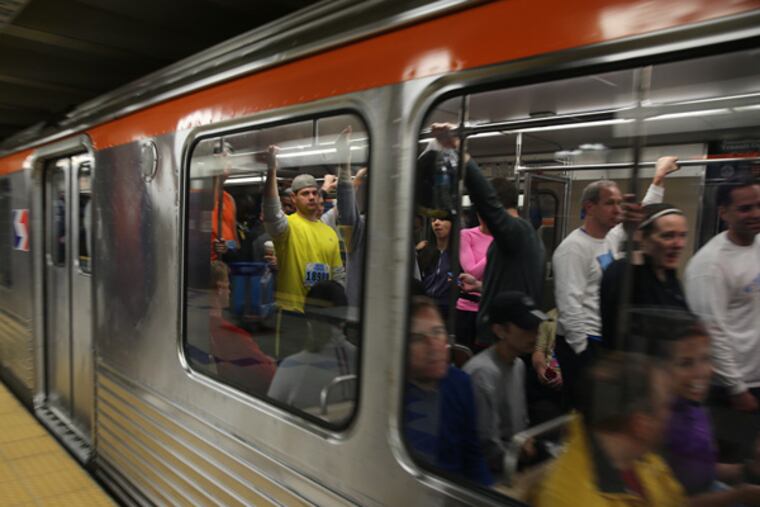SEPTA OKs $300 million in spending
Christmas came early for SEPTA on Thursday. The transit agency's board of directors authorized nearly $300 million in vehicle purchases and construction projects. Also, it approved a $1.36 billion operating budget and $535 million capital budget for the fiscal year that starts July 1.

Christmas came early for SEPTA on Thursday.
The transit agency's board of directors authorized nearly $300 million in vehicle purchases and construction projects. Also, it approved a $1.36 billion operating budget and $535 million capital budget for the fiscal year that starts July 1.
Separately, the board approved a new advertising policy to prohibit political ads, following a federal court ruling earlier this year that required SEPTA to accept bus ads featuring Adolf Hitler.
The big-ticket spending items approved by the board Thursday included:
Up to $154 million for 18 Regional Rail locomotives, to be delivered in 2018.
$29 million for a new rail station and an 895-space parking garage at the existing rail station in Lansdale.
$26.8 million for five years of paratransit services in Delaware County, to be provided by Community Transit of Delaware County.
$20.2 million for reconstruction of the Levittown train station.
$17.6 million for 232 minibuses, for paratransit service.
$10 million for a roof replacement at SEPTA's Berridge Bus Overhaul Facility and Second and Wyoming office in North Philadelphia.
$8.3 million for upgrades at the Exton rail station.
$6.7 million to rebuild the Morton power substation.
$6.5 million for a new building at the Frankford Transportation Center.
$4.6 million for rehabilitation of the Margaret-Orthodox station on the Market-Frankford line.
$1.3 million for train-control equipment.
$0.9 million for improved lighting for Broad Street Subway and light-rail stations.
Much of the money will come from the $535 million capital budget approved by the board Thursday.
The capital budget, for major construction projects and vehicle purchases, is about 6.4 percent less than the current capital budget but nearly double the capital budgets in place before 2013, when the state increased its financial support for transportation.
The board also approved SEPTA's annual operating budget, at $1.36 billion.
Rising labor and health-care costs are the biggest drivers of the 2.84 percent increase in the operating budget.
The $1.36 billion budget calls for 70 more employees - mostly in safety and construction-support positions - and would make permanent the all-night subway service on Fridays and Saturdays that began as an experiment this year.
The budget includes no fare increases. It anticipates a state subsidy of $658 million, up by $29 million from the current spending plan.
The board also approved a new advertising policy, following a March 11 ruling by U.S. District Judge Mitchell S. Goldberg that SEPTA had to accept a controversial bus ad featuring Hitler because the agency had previously accepted other political and controversial ads on public issues.
The new policy prohibits political ads or any ad that expresses an opinion about political, economic, religious, historical, or social issues, or disparages any person or group, or that could incite lawless action, or prompt a lawsuit for defamation or invasion of privacy.
Also, no ads may promote the sale of tobacco or guns.
The policy also will require an advertiser to agree to pay the cost of any legal challenge or any physical damage caused by reactions to an ad.
The controversial ad, which stated, "Islamic Jew-Hatred: It's in the Quran," was paid for by the American Freedom Defense Initiative, an organization underwritten by a Jewish activist, Pamela Geller, an outspoken critic of Islam.
The ad featured a photograph of a 1941 meeting between Hitler and Hajj Amin al-Husseini, a Palestinian Arab nationalist who made radio broadcasts supporting the Nazis.
A Philadelphia trial lawyer, Justin Kweder, urged the board not to approve the new advertising policy, warning that removing such a public forum would prompt costly legal challenges.
215-854-4587
@nussbaumpaul